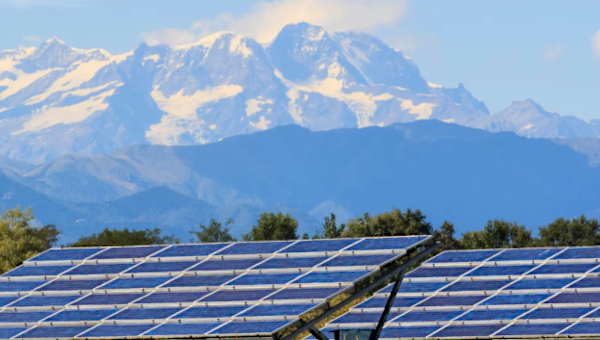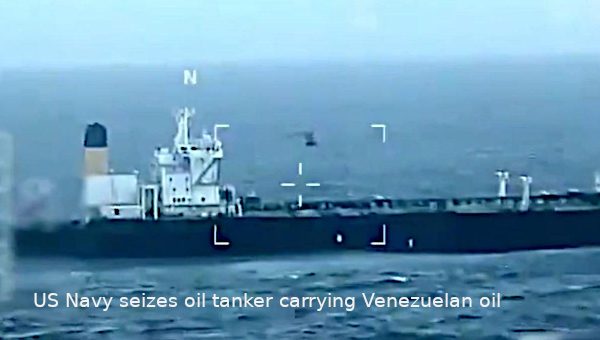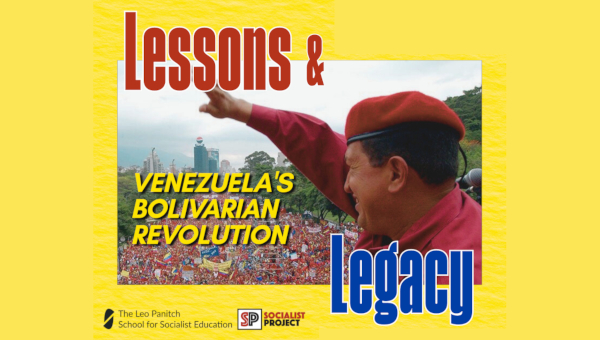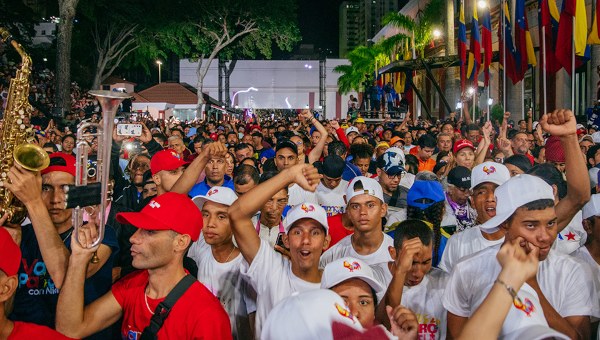Canadian Government Endorses Overthrow of Venezuela Government
During the last two days, both the U.S. and Canadian governments have encouraged the overthrow of the democratically elected government of Venezuela by non-electoral means. The Socialist Project calls on these governments to cease their interference in Venezuela’s internal political process and to halt all sanctions against the country. The Canadian government can best aid the Venezuelan people through strict respect for Venezuela’s sovereignty and the Venezuelan people’s right to determine their own future.
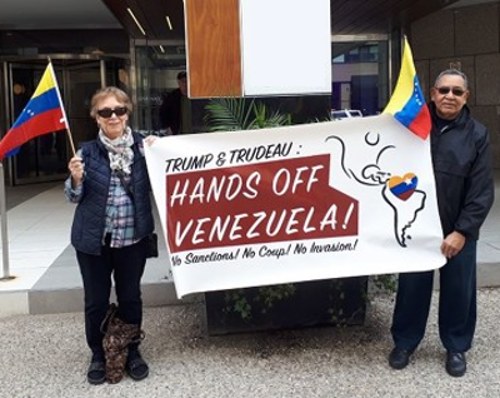 We encourage participation in the action against a U.S.-orchestrated regime change to be held Saturday, January 26 at 2:30 p.m. at Spadina and Bloor, Toronto, and at other locations across Canada and Quebec. •
We encourage participation in the action against a U.S.-orchestrated regime change to be held Saturday, January 26 at 2:30 p.m. at Spadina and Bloor, Toronto, and at other locations across Canada and Quebec. •
— Steering Committee of the Socialist Project
Common Frontiers Rejects Interference in Venezuela’s Democratic Order
On May 20, 2018 Presidential elections were held in Venezuela, and incumbent Nicolás Maduro was re-elected president for a second term with 67.8% of the vote. A delegation of Canadian election observers were on the ground as eyewitnesses and corroborated what international elections observers unanimously reported – the Venezuelan presidential elections were fair, transparent and represented the will of the Venezuelan people.
The Canadian government, along with its allies in the Lima Group, have consistently attempted to delegitimatize President Maduro and provide unconditional support to extreme right-wing sectors of the Venezuelan opposition. The New York Times reported that the Trump administration has been actively discussing plans with rebel Venezuelan military officials to stage a coup against president, Nicolás Maduro. Over the past couple of days, the Trump administration has escalated its attacks against Venezuela including recognizing self-proclaimed opposition leader, Juan Gerardo Guaidó as interim president of Venezuela. Prime Minister Justin Trudeau echoed Trump and called upon president Nicolás Maduro to “cede power to the democratically elected National Assembly.” Juan Gerardo Guaidó is a relative unknown figure in Venezuela with no mandate from the people and whose actions have no constitutional bases whatsoever.
Common Frontiers is deeply concerned with these actions and Prime Minister Justin Trudeau’s willingness to follow Trump’s lead. We consider the actions of the Canadian government to be a provocation which violates Venezuela’s sovereignty and democratic norms. This reflects interventionist policies that seek nothing less than undemocratic regime change in Venezuela. Canada’s actions will only serve to heighten the conflict and polarization facing the country with the added danger of an open civil war between supporters of Guaidó and Maduro. Accounts from Venezuela indicate at least 13 people were killed on January 23rd in the context of violent demonstrations and street blockades during the recent protests called for by Guaidó and his supporters.
We reject any attempts by the Canadian government to interfere with the sovereignty and democratic order in Venezuela or actions that seek to bring about regime change.
Canada should not be supporting U.S. led coups and be seen as playing politics with democracy and human rights in the region. Prime Minister Justin Trudeau has consistently and vehemently condemned Venezuela, while turning a blind eye to well documented fraudulent elections and human rights abuses in Guatemala and Honduras.
The economic and political problems facing Venezuela must be resolved internally by Venezuelans through peaceful dialogue and in accordance with the democratic norms of the country. The role of Canada and the international community should be to support and foster a climate of dialogue and peace, rather than to support attempts to impose a Washington based solution to the crisis in Venezuela. •
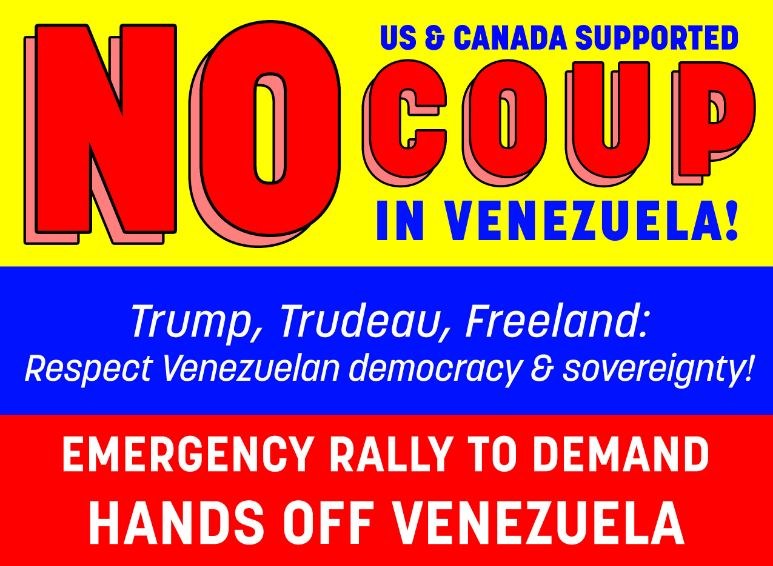
Stop Dangerous and Counterproductive U.S. Intervention in Venezuela
DSA Statement on Venezuela
Democratic Socialists of America (DSA) categorically opposes any and all efforts by the U.S. government to intervene in the domestic politics of Venezuela. The U.S. has a long and bloody track record of actions to overthrow democratically elected governments, stop the spread of socialism, and maintain U.S. imperial dominance in the region. This includes the U.S. government’s support of the 2002 Venezuelan coup that led to the temporary ouster of the legitimately-elected president of Venezuela, Hugo Chávez. These imperial interventions must stop immediately; the future of the Venezuelan people, and the broader prosperity of Latin America depend on it.
Venezuela is currently suffering devastating economic and political crises that have left millions without consistent access to basic goods and services, and in a state of perpetual insecurity. Inflation has reached astronomical levels, rendering the local currency practically valueless, and limiting the positive impact of regular minimum wage increases implemented by the Venezuelan government. In the wake of President Nicolás Maduro’s inauguration for a second term on January 10, the political situation has become still more dire.
Maduro’s inauguration was accompanied by claims from both the Venezuelan opposition as well as a host of governments in the region and beyond that, he is no longer the legitimately elected President of Venezuela. These claims are based on prior accusations that the May 2018 Venezuelan presidential election was marred by the government’s use of tactics that ensured Maduro’s victory in advance.
The newly-appointed leader of the opposition-controlled Venezuelan National Assembly, Juan Guaidó of the right-wing Voluntad Popular (Popular Will) party, used this legitimacy crisis as an opportunity to proclaim himself the acting President of Venezuela, and called upon the Venezuelan people to rise up in protest against the Maduro government. Many, including a small band of National Guard soldiers on January 22 (who were quickly suppressed by security forces), have heeded the call, leading to sustained protests across the country beginning on January 21.
Though there have been reports of repression on the part of the Venezuelan security forces (including the brief arrest of Guaidó himself outside Caracas) and property damage on the part of opposition protesters (including the arson of an important community center in Caracas), significant confrontations between government and opposition supporters have yet to materialize. Nor has there been any indication that top military leaders are planning to break with Maduro. Nonetheless, the situation remains extremely tense. Any small political miscalculation could provoke serious violence and chaos in the country.
The role of the United States government in this unfolding situation over the last two weeks has been substantial and extremely counterproductive. Its actions have served only to deepen political divisions and decrease the likelihood of a peaceful solution to the crisis. President Trump and Vice President Pence have both expressed their full support for the unelected Guaidó as acting President, and are working tirelessly to organize other nations to do the same. Further, Trump has stated that he is contemplating a military intervention in Venezuela, and the U.S. National Security Council has indicated that it is strongly considering an embargo on Venezuelan oil imports to the United States. These actions would each have catastrophic consequences for the already suffering Venezuelan people. The U.S. government is clearly more interested in using Venezuela as a boogeyman to show the dangers of socialism than in playing a constructive role in resolving the crisis. Unfortunately the consequences of this rhetorical posturing are all too real for the Venezuelan people.
The U.S. government’s recent actions to destabilize Venezuela are only the most recent in a long series of unfortunate actions it has taken over the past several years. In addition to past reckless and worrying comments made by President Trump and other members of his administration about the need for foreign military intervention in Venezuela, the U.S. government has imposed financial sanctions against Venezuela. These sanctions are putting further constraints on the importation of desperately needed food and medicine into Venezuela.
The sanctions also preclude Venezuelan firms from access to U.S. credit, effectively eliminating the Venezuelan oil sector’s capacity to maintain current levels of production, let alone return to pre-2015 levels (which were more than twice as high as current levels). Given that Venezuela depends so heavily on oil exports to fund the importation of basic goods, the U.S. government’s sanctions against Venezuela’s oil sector are tantamount to direct sanctions against the Venezuelan people, whose economic security grows more precarious by the week.
Both the increasingly top-down Venezuelan government as well as the fractious Venezuelan opposition, which has at times resorted to anti-democratic methods, bear significant responsibility for the current crisis and there are important critiques to be leveled against both. As U.S. socialists, we have a duty to do everything we can to stop U.S. imperialism and make the world safe for democracy and socialism; however, our role as an organization should not be to intervene in the internal politics of Venezuela. Instead, we have a responsibility to use the leverage we have to intervene strategically in U.S. foreign policy to help the Venezuelan people defend the gains made during Hugo Chávez’s presidency.
To that end, we call upon the U.S. government to immediately cease and desist all attempts to intervene in the internal politics of Venezuela and break with its shameful legacy of imperial control in the region. Further, we call upon DSA chapters and DSA supported political representatives to mobilize in this particularly critical moment around a campaign of solidarity with the Venezuelan people, aimed specifically at reversing the U.S. government’s disastrous and counterproductive sanctions against Venezuela.
Solidarity with the people of Venezuela! Solidarity with the Bolivarian Revolution! •
— Democratic Socialists of America
Open Letter Condemns U.S.-Backed Coup Attempt in Venezuela
Common Dreams staff
As many American lawmakers, pundits, and advocacy groups remain conspicuously silent in response to U.S. President Donald Trump’s decision to formally recognize Venezuela’s opposition leader as the “interim president” – a move that was denounced as open support for an attempted coup d’état – renowned linguist Noam Chomsky, filmmaker Boots Riley, and over 70 other academics and experts issued an open letter on Thursday calling on the Trump administration to “cease interfering in Venezuela’s internal politics.”
“Actions by the Trump administration and its allies in the hemisphere are almost certain to make the situation in Venezuela worse, leading to unnecessary human suffering, violence, and instability,” the letter reads. “The U.S. and its allies must cease encouraging violence by pushing for violent, extralegal regime change. If the Trump administration and its allies continue to pursue their reckless course in Venezuela, the most likely result will be bloodshed, chaos, and instability.”
Highlighting the harm American sanctions have inflicted upon the Venezuelan economy and people, the letter goes on to denounce the White House’s “aggressive” actions and rhetoric against Venezuela’s government, arguing that peaceful talks are the only way forward.
“In such situations, the only solution is a negotiated settlement, as has happened in the past in Latin American countries when politically polarized societies were unable to resolve their differences through elections,” the letter reads. “For the sake of the Venezuelan people, the region, and for the principle of national sovereignty, these international actors should instead support negotiations between the Venezuelan government and its opponents that will allow the country to finally emerge from its political and economic crisis.”
Read the full letter below:
The United States government must cease interfering in Venezuela’s internal politics, especially for the purpose of overthrowing the country’s government. Actions by the Trump administration and its allies in the hemisphere are almost certain to make the situation in Venezuela worse, leading to unnecessary human suffering, violence, and instability.
Venezuela’s political polarization is not new; the country has long been divided along racial and socioeconomic lines. But the polarization has deepened in recent years. This is partly due to U.S. support for an opposition strategy aimed at removing the government of Nicolás Maduro through extra-electoral means. While the opposition has been divided on this strategy, U.S. support has backed hardline opposition sectors in their goal of ousting the Maduro government through often violent protests, a military coup d’etat, or other avenues that sidestep the ballot box.
Under the Trump administration, aggressive rhetoric against the Venezuelan government has ratcheted up to a more extreme and threatening level, with Trump administration officials talking of “military action” and condemning Venezuela, along with Cuba and Nicaragua, as part of a “troika of tyranny.” Problems resulting from Venezuelan government policy have been worsened by U.S. economic sanctions, illegal under the Organization of American States and the United Nations – as well as U.S. law and other international treaties and conventions. These sanctions have cut off the means by which the Venezuelan government could escape from its economic recession, while causing a dramatic falloff in oil production and worsening the economic crisis, and causing many people to die because they can’t get access to life-saving medicines. Meanwhile, the U.S. and other governments continue to blame the Venezuelan government – solely – for the economic damage, even that caused by the U.S. sanctions.
Now the U.S. and its allies, including OAS Secretary General Luis Almagro and Brazil’s far-right president, Jair Bolsonaro, have pushed Venezuela to the precipice. By recognizing National Assembly President Juan Guaidó as the new president of Venezuela – something illegal under the OAS Charter – the Trump administration has sharply accelerated Venezuela’s political crisis in the hopes of dividing the Venezuelan military and further polarizing the populace, forcing them to choose sides. The obvious, and sometimes stated goal, is to force Maduro out via a coup d’etat.
The reality is that despite hyperinflation, shortages, and a deep depression, Venezuela remains a politically polarized country. The U.S. and its allies must cease encouraging violence by pushing for violent, extralegal regime change. If the Trump administration and its allies continue to pursue their reckless course in Venezuela, the most likely result will be bloodshed, chaos, and instability. The U.S. should have learned something from its regime change ventures in Iraq, Syria, Libya, and its long, violent history of sponsoring regime change in Latin America.
Neither side in Venezuela can simply vanquish the other. The military, for example, has at least 235,000 frontline members, and there are at least 1.6 million in militias. Many of these people will fight, not only on the basis of a belief in national sovereignty that is widely held in Latin America – in the face of what increasingly appears to be a U.S.-led intervention – but also to protect themselves from likely repression if the opposition topples the government by force.
In such situations, the only solution is a negotiated settlement, as has happened in the past in Latin American countries when politically polarized societies were unable to resolve their differences through elections. There have been efforts, such as those led by the Vatican in the fall of 2016, that had potential, but they received no support from Washington and its allies who favored regime change. This strategy must change if there is to be any viable solution to the ongoing crisis in Venezuela.
For the sake of the Venezuelan people, the region, and for the principle of national sovereignty, these international actors should instead support negotiations between the Venezuelan government and its opponents that will allow the country to finally emerge from its political and economic crisis. •
Signed:
- Noam Chomsky, Professor Emeritus, MIT and Laureate Professor, University of Arizona
- Laura Carlsen, Director, Americas Program, Center for International Policy
- Greg Grandin, Professor of History, New York University
- Miguel Tinker Salas, Professor of Latin American History and Chicano/a Latino/a Studies at Pomona College
- Sujatha Fernandes, Professor of Political Economy and Sociology, University of Sydney
- Steve Ellner, Associate Managing Editor of Latin American Perspectives
- Alfred de Zayas, former UN Independent Expert on the Promotion of a Democratic and Equitable International Order and only UN rapporteur to have visited Venezuela in 21 years
- Boots Riley, Writer/Director of Sorry to Bother You, Musician
- John Pilger, Journalist & Film-Maker
- Mark Weisbrot, Co-Director, Center for Economic and Policy Research
- Jared Abbott, PhD Candidate, Department of Government, Harvard University
- Dr. Tim Anderson, Director, Centre for Counter Hegemonic Studies
- Elisabeth Armstrong, Professor of the Study of Women and Gender, Smith College
- Alexander Aviña, PhD, Associate Professor of History, Arizona State University
- Marc Becker, Professor of History, Truman State University
- Medea Benjamin, Cofounder, CODEPINK
- Phyllis Bennis, Program Director, New Internationalism, Institute for Policy Studies
- Dr. Robert E. Birt, Professor of Philosophy, Bowie State University
- Aviva Chomsky, Professor of History, Salem State University
- James Cohen, University of Paris 3 Sorbonne Nouvelle
- Guadalupe Correa-Cabrera, Associate Professor, George Mason University
- Benjamin Dangl, PhD, Editor of Toward Freedom
- Dr. Francisco Dominguez, Faculty of Professional and Social Sciences, Middlesex University, UK
- Alex Dupuy, John E. Andrus Professor of Sociology Emeritus, Wesleyan University
- Jodie Evans, Cofounder, CODEPINK
- Vanessa Freije, Assistant Professor of International Studies, University of Washington
- Gavin Fridell, Canada Research Chair and Associate Professor in International Development Studies, St. Mary’s University
- Evelyn Gonzalez, Counselor, Montgomery College
- Jeffrey L. Gould, Rudy Professor of History, Indiana University
- Bret Gustafson, Associate Professor of Anthropology, Washington University in St. Louis
- Peter Hallward, Professor of Philosophy, Kingston University
- John L. Hammond, Professor of Sociology, CUNY
- Mark Healey, Associate Professor of History, University of Connecticut
- Gabriel Hetland, Assistant Professor of Latin American, Caribbean and U.S. Latino Studies, University of Albany
- Forrest Hylton, Associate Professor of History, Universidad Nacional de Colombia-Medellín
- Daniel James, Bernardo Mendel Chair of Latin American History
- Chuck Kaufman, National Co-Coordinator, Alliance for Global Justice
- Daniel Kovalik, Adjunct Professor of Law, University of Pittsburgh
- Winnie Lem, Professor, International Development Studies, Trent University
- Dr. Gilberto López y Rivas, Professor-Researcher, National University of Anthropology and History, Morelos, Mexico
- Mary Ann Mahony, Professor of History, Central Connecticut State University
- Jorge Mancini, Vice President, Foundation for Latin American Integration (FILA)
- Luís Martin-Cabrera, Associate Professor of Literature and Latin American Studies, University of California San Diego
- Teresa A. Meade, Florence B. Sherwood Professor of History and Culture, Union College
- Frederick Mills, Professor of Philosophy, Bowie State University
- Stephen Morris, Professor of Political Science and International Relations, Middle Tennessee State University
- Liisa L. North, Professor Emeritus, York University
- Paul Ortiz, Associate Professor of History, University of Florida
- Christian Parenti, Associate Professor, Department of Economics, John Jay College CUNY
- Nicole Phillips, Law Professor at the Université de la Foundation Dr. Aristide Faculté des Sciences Juridiques et Politiques and Adjunct Law Professor at the University of California Hastings College of the Law
- Beatrice Pita, Lecturer, Department of Literature, University of California San Diego
- Margaret Power, Professor of History, Illinois Institute of Technology
- Vijay Prashad, Editor, The TriContinental
- Eleanora Quijada Cervoni FHEA, Staff Education Facilitator & EFS Mentor, Centre for Higher Education, Learning & Teaching at The Australian National University
- Walter Riley, Attorney and Activist
- William I. Robinson, Professor of Sociology, University of California, Santa Barbara
- Mary Roldan, Dorothy Epstein Professor of Latin American History, Hunter College/ CUNY Graduate Center
- Karin Rosemblatt, Professor of History, University of Maryland
- Emir Sader, Professor of Sociology, University of the State of Rio de Janeiro
- Rosaura Sanchez, Professor of Latin American Literature and Chicano Literature, University of California, San Diego
- T.M. Scruggs Jr., Professor Emeritus, University of Iowa
- Victor Silverman, Professor of History, Pomona College
- Brad Simpson, Associate Professor of History, University of Connecticut
- Jeb Sprague, Lecturer, University of Virginia
- Kent Spriggs, International human rights lawyer
- Christy Thornton, Assistant Professor of History, Johns Hopkins University
- Sinclair S. Thomson, Associate Professor of History, New York University
- Steven Topik, Professor of History, University of California, Irvine
- Stephen Volk, Professor of History Emeritus, Oberlin College
- Kirsten Weld, John. L. Loeb Associate Professor of the Social Sciences, Department of History, Harvard University
- Kevin Young, Assistant Professor of History, University of Massachusetts Amherst
- Patricio Zamorano, Academic of Latin American Studies; Executive Director, InfoAmericas


